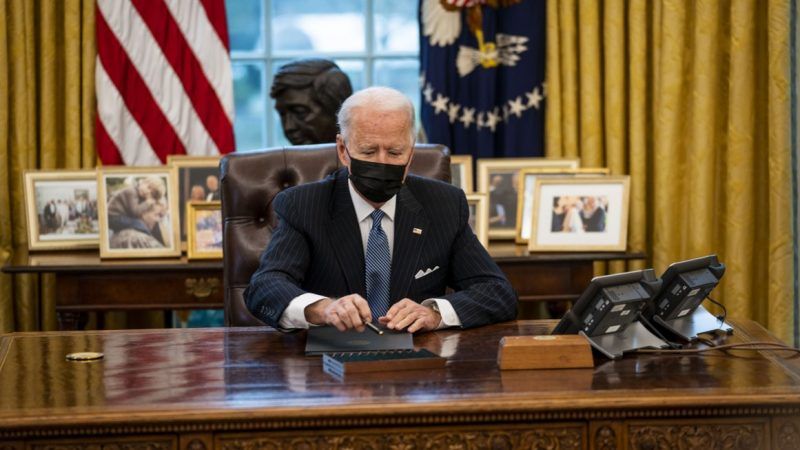Biden Orders Justice Department To Phase Out Use of Private Prisons
Biden reportedly will also reinstate restriction on transfers of surplus military gear to police.

President Joe Biden issued an executive order today to phase out the Justice Department's use of private prisons.
As part of what the White House dubbed "equity day," Biden signed an order directing the Justice Department not to renew contracts with private prisons, which have long been a target of criminal justice reform advocates.
"Mass incarceration imposes significant costs on our society and communities, while private prisons profiteer off of federal prisoners in less safe conditions for prisoners and correctional officers alike," the White House said in a fact sheet, according to Reuters.
Civil liberties and criminal justice groups applauded the order, although it was far from their most significant demands of the new administration, which include ending the federal death penalty and ending solitary confinement.
"Today's executive order validates something we've been saying for years: No one should profit from the human misery that is caused by mass incarceration," David Fathi, director of the American Civil Liberties Union's national prison project, said in a press release. "Prison privatization increases the potential for mistreatment and abuse of incarcerated people, and this move by the Biden administration will start curtailing this insidious practice."
In the grand scheme of the U.S. criminal justice system, the order will not have a significant impact. State prison systems hold the majority of the roughly 2.3 million incarcerated people in the country. And of the federal prison population, only 15 percent are held in private prisons.
Fathi noted that Biden's order will not touch the Department of Homeland Security, which oversees the immigration detention system, nor the private contractors the Bureau of Prisons (BOP) uses for other services, such as medical care. Fathi said that while today's order is a good first step, "President Biden has an obligation to do more, especially given his history and promises."
Nor are private prisons the source of the most pressing problems within the federal prison system. Even before the COVID-19 pandemic struck, the BOP was under severe stress due to chronic understaffing, which led to nurses and cooks being pressed into guard duty. There were also persistent problems with corruption, sexual assault, medical neglect, and low staff morale, not to mention the embarrassing death of disgraced financier Jeffrey Epstein in a Manhattan jail.
Reason reported last year on a string of deaths due to alleged medical neglect at FCI Aliceville, a federal women's prison in Alabama.
The pandemic put all of these problems into even sharper relief, as the federal prison system struggled, and failed, to adequately protect incarcerated people and staff.
CNN also reported that Biden will sign an executive order reinstating Obama-era limits on the transfer of military equipment to local and state law enforcement. The Pentagon's 1033 program distributes surplus military equipment to police. Most of those items are mundane things like cold-weather gloves and filing cabinets.
Amid national outrage over images of militarized police in Ferguson, Missouri, the Obama administration limited the program in 2015, prohibiting the transfer of such items as camouflage, .50-caliber ammunition, tracked armored vehicles, grenade launchers, and bayonets. Police departments in possession of these items were asked to return them.
President Donald Trump, who portrayed himself as a staunch ally of the police, rescinded the Obama memo, including tighter reporting requirements, in 2017.
A Brown University study published last year found that the Department of Defense's (DOD) 1033 program has transferred at least $1.6 billion worth of equipment to police departments across the country since 9/11, compared to just $27 million before the terrorist attack. That equipment includes mine-resistant, armored-protective vehicles, or MRAPs, which are hulking, armored personnel carriers designed to survive bomb blasts on the roads of Iraq and Afghanistan. Thanks to the 1033 program, 1,114 MRAPs are currently in the possession of American police departments.
The 1033 program is not the most significant federal source of police militarization, though. The program is dwarfed by Department of Homeland Security anti-terrorism grants to local police, as well as shared revenue from property seizures and forfeitures.

Show Comments (104)